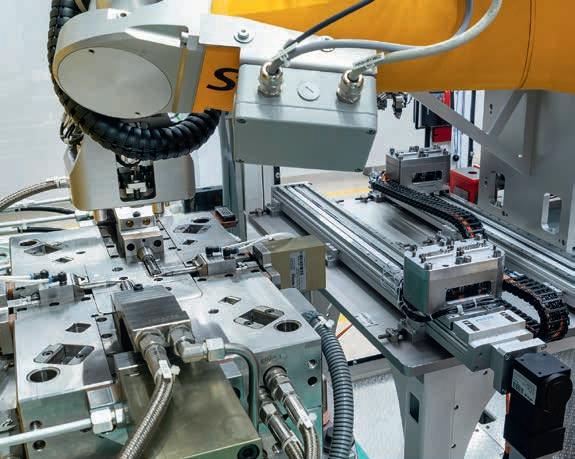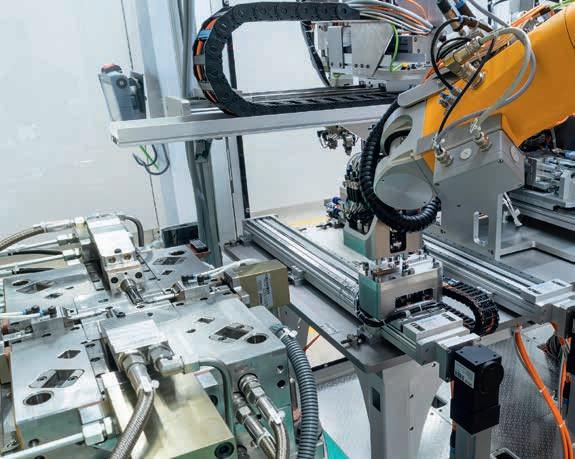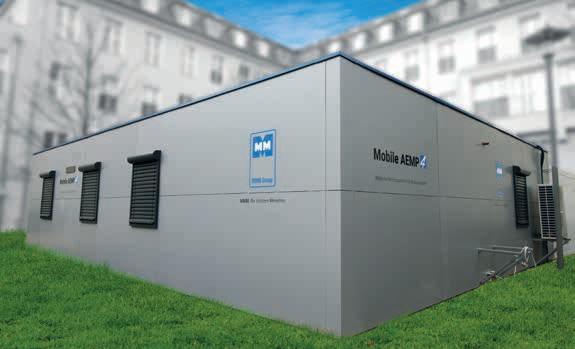
3 minute read
Staiger GmbH & Co. KG
Name ›
Address/P.O. Box › Postal Code/City › State › Contact Person ›
Telephone › Fax › Email › Website ›
Social Media › Number of Employees › Founded (year) ›
Areas of Activity ›
Stäubli Tec Systems GmbH Robotics
Theodor-Schmidt-Strasse 19/25 95448 Bayreuth Bavaria Rudolf M. Weiss Global Head of Pharma and Medical Robotics +49-921-883-3258 +49-921-883-3444 rm.weiss@staubli.com www.linkedin.com/showcase/ staubli-robotics/
F LI Q
5,500 1892
l Industrial automation l Industrial robots l Life sciences l Medical technologies
Injection moulding machine automation at warp speed
Last year an American company was producing 600,000 COVID-19 vaccine vials daily using 11 injection moulding machines. Zahoransky AG of Freiburg was tasked with delivering 11 lines with 120 image processing systems and 53 robots in the shortest time possible to automate the machines.
Producing the nano-coated cyclic olefin copolymer (COC) vaccine vials on injection moulding machines was not the biggest challenge: each of the 11 machines used in the final configuration produces 10 vials every 17 seconds. But before they receive the final nano coating, the vials must undergo numerous process steps immediately after production.
For its automated lines, Zahoransky required a total of 53 4-axis and 6-axis robots in just a few weeks. As a leading provider of robots to the pharmaceutical and medical industries, Stäubli was a clear choice for this large order. The delivery of robots in such a short time was a real challenge for Stäubli, especially given the reduced hours due to the coronavirus. In order to fill the order, Stäubli used robots originally intended for its own internal training and presentation cells.
Member of

600,000 vaccine vials a day are handled, processed and inspected directly on the machines in a fully automated process.


With their groundbreaking hygienic design, the Stäubli robots already meet the applicable cleanroom classifi cation in their standard version.



Each of the machines produces 10 vials every 17 seconds. These must pass through numerous process steps directly after production.

The complete injection moulding lines consist of three standard cells, Z.Siroc, Z.Mistral, and Z.Lodos, which link seamlessly with one another. The complete line is supplied with high pressure and achieves ISO Class 8 cleanroom requirements. Each line includes three Stäubli robots. The systems take on all process steps, from parts removal from the injection moulding machine to the transfer to the nano-coating line.
The Z-SIROC module, which is equipped with two Stäubli robots, establishes the direct interface to the injection moulding machine. The fi rst robot, a 6-axis TX2-60L, unloads the injection moulding machine, picking up 10 vials and placing them on a cooling belt. An ultra-fast Stäubli SCARA TS2-80 then transfers the cooled containers to the Z.Mistral module, where a number of QA tests are carried out. Afterward the vials reach a defi ned transfer point, where they are removed by a Stäubli SCARA TS2-60 installed in the Z.Lodos module. The fast and precise 4-axis robot places the vials in tubs, which are discharged for nano coating.
Benefi ts:
› Ultra-fast delivery of the lines › Highest QA standards with guaranteed parts traceability › Absolute compliance with industry-specifi c standards › Impressive output of 600,000 vials daily
Thanks to the expertise of the Zahoransky team and the performance of the Stäubli robots, this highly challenging project was realized in the shortest possible time – thereby making a critical contribution in the fi ght against the pandemic.
Contact us at www.staubli.com/en/robotics to fi nd out how we can provide our expertise for your automation needs.










